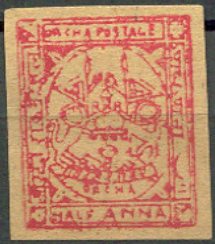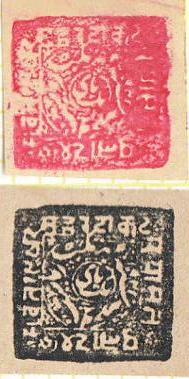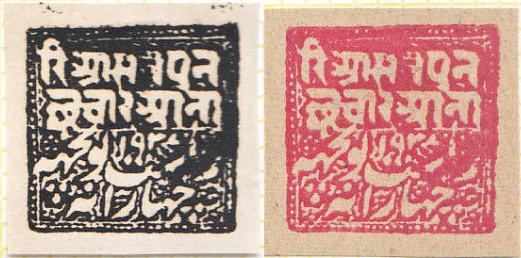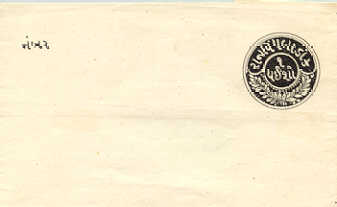 |
|||||
|
|||||
| Preview of Stamps Catalogue: VOLUME 1 |
 |
|||||
|
|||||
| Preview of Stamps Catalogue: VOLUME 1 |
Note: on my website many of the
pictures can not be seen! They are of course present in the catalogue;
contact me if you want to purchase it.
1/2 a brown 1 a violet 2 a yellow 4 a green
Value of the stamps |
|||
vc = very common c = common * = not so common ** = uncommon |
*** = very uncommon R = rare RR = very rare RRR = extremely rare |
||
| Value | Unused | Used | Remarks |
| 1/2 a | *** | - | |
| 1 a | *** | - | |
| 2 a | *** | - | |
| 4 a | *** | - | |
These stamps appear to have been prepared by a Swiss jeweller in 1897, but were not accepted by the government of Orcha and were subsequently dumped on the stamp market. They exist cancelled to order with a 'O' cancel in bars.
1/4 a blue 1/2 a green (two types) 1 a red (two types) 2 a brown 4 a orange
Value of the stamps |
|||
vc = very common c = common * = not so common ** = uncommon |
*** = very uncommon R = rare RR = very rare RRR = extremely rare |
||
| Value | Unused | Used | Remarks |
| 1/4 a | c | c | |
| 1/2 a | c | c | |
| 1 a | * | * | |
| 2 a | * | * | |
| 4 a | ** | ** | |
Crude forgery:


Forgeries, genuine stamps should have background lines.
For more information on forgeries: http://www.princelystates.com/CurrentIssue/ff-04-01d.shtml
Pountch
Poonch issued stamps from 1876 onwards. In 1894 Poonch stopped using its own stamps.
1 p red 1 p black (official stamp) 6 p red
Value of the stamps |
|||
vc = very common c = common * = not so common ** = uncommon |
*** = very uncommon R = rare RR = very rare RRR = extremely rare |
||
| Value | Unused | Used | Remarks |
| 1 p red | ** | * | |
| 1 p black | ** | *** | |
| 6 p red | RRR | RR | |


Modern forgeries

1/2 a red 1/2 a black (official stamp) 1 a red 1 a black (official stamp) 2 a red 2 a black (official stamp) 4 a red 4 a black (official stamp)
These stamps were printed on a variety of coloured papers.
Value of the stamps |
|||
vc = very common c = common * = not so common ** = uncommon |
*** = very uncommon R = rare RR = very rare RRR = extremely rare |
||
| Value | Unused | Used | Remarks |
| 1/2 a red | ** | *** | |
| 1/2 a black | *** | *** | |
| 1 a red | ** | *** | |
| 1 a black | *** | *** | |
| 2 a red | *** | *** | |
| 2 a black | *** | *** | |
| 4 a red | *** | *** | |
| 4 a black | *** | *** | |





Modern forgeries.
After 1894 this country no longer issued its own stamps.
Rajpeepla
1 p blue 2 a green 4 a brown
I've been told that there are 64 varieties of the 1 p (a sheet of 1 p stamps contains 8x8 stamps). The two other values are printed in sheets of 20 (4 rows of 5 stamps).
Value of the stamps |
|||
vc = very common c = common * = not so common ** = uncommon |
*** = very uncommon R = rare RR = very rare RRR = extremely rare |
||
| Value | Unused | Used | Remarks |
| 1 p | ** | *** | |
| 2 a | *** | R | |
| 4 a | *** | R | |





Very primitive forgeries, produced in the 1980's(?). See: Indian States, modern forgeries for
more information. The 4 a is imperforate and the lines behind the
sword have almost entirely disappeared. Next to it some 1 p
imperforate forgeries, most likely from the same source. I've
also seen an imperforate 1 p stamp in the color lilac.

Strange item with printed perforation?



This might be a forgery, according to
http://www.rajpiplapost.com/, the cancel 'R' in bars does not
exist for Rajpipla. Genuine cancels have native script in the
bars. Also the margins of this stamp appear too large. A similar
1 p blue forgery is shown there with too wide margins and a break
in the outer frameline in the upper right corner. The pair of 1 p
blue forgeries is this forgery type as well. Lastly, two more
forgeries, most likely from the same workshop.

Imperforate 1 p stamp with unclear cancel. Most likely a forgery.

Badly printed 1 p stamp in dark blue color, very dubious item.
Envelope, example:

Dangerous forgeries of cut-outs of these envelopes exist (not entire envelopes), complete with cancel and handwritten text on the back.
Revenue stamps:

1888 issue; the following three values were issued: 1 a orange, 1
a blue and 1 a green.

1904 issue 1 a lilac on lilac.
Stamps - Timbres-Poste - Briefmarken - Postzegels